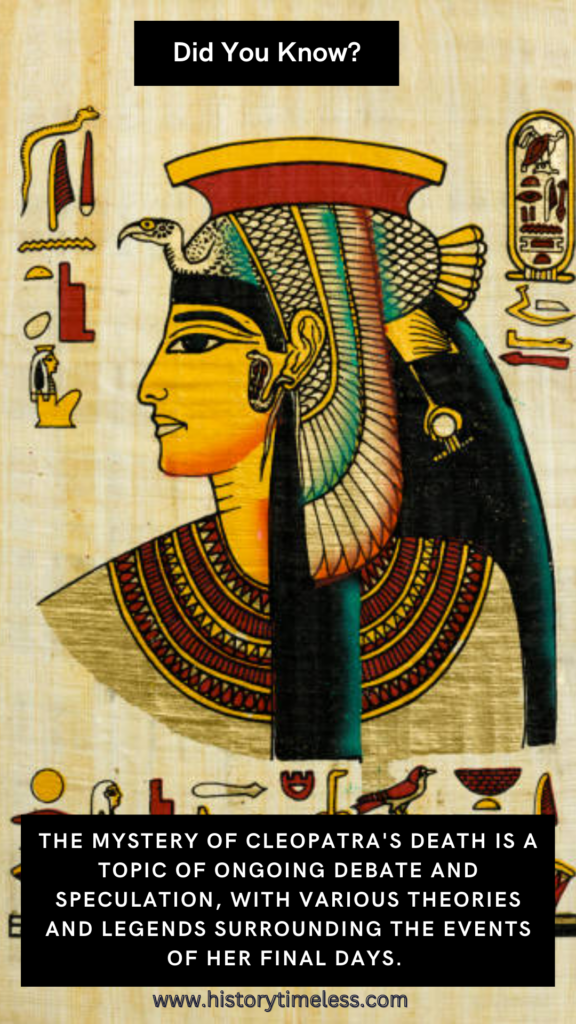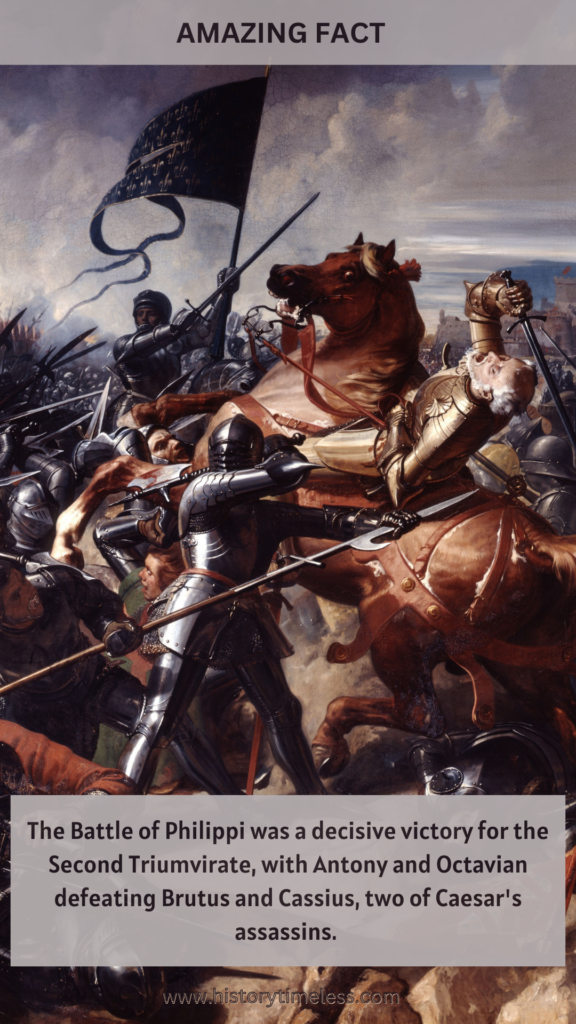Cleopatra, the last pharaoh of Ancient Egypt, is a figure shrouded in mystery and intrigue. Her life and reign have been the subject of countless stories, legends, and myths.
From her tumultuous relationships with Julius Caesar and Mark Antony to her impressive diplomatic and military prowess, Cleopatra’s life was a complex web of politics, passion, and power. In this blog, we’ll delve into 30 startling facts about Cleopatra, exploring the fascinating details of her life and legacy.
1. The Cultural Significance of Cleopatra in the Modern Era
The cultural significance of Cleopatra in the modern era is profound and far-reaching, reflecting her enduring legacy as a symbol of feminine power and intelligence. From literature and film to fashion and beauty, Cleopatra’s image and story continue to inspire and captivate audiences around the world.
2. The Reign of Cleopatra: A Golden Age
The reign of Cleopatra is often referred to as a golden age, marked by significant cultural, scientific, and economic achievements. From the construction of grand buildings and monuments to the development of new technologies and discoveries, Cleopatra’s Egypt was a land of innovation and progress.
3. The Role of Women in Ancient Egypt
The role of women in ancient Egypt was complex and multifaceted. While women were often relegated to secondary roles, they also enjoyed a degree of freedom and autonomy that was unusual in the ancient world.
Cleopatra’s own life and reign serve as a testament to the power and influence that women could wield in ancient Egyptian society.
4. The Egyptian Economy Under Cleopatra
The Egyptian economy flourished under Cleopatra’s rule, with trade and commerce reaching new heights. The Nile River was a major source of wealth, with the annual floods bringing nutrient-rich silt that made the surrounding land suitable for farming.
Cleopatra’s diplomatic efforts also helped to secure Egypt’s position as a major player in the ancient world.
5. The Mystery of Cleopatra’s Death
The mystery of Cleopatra’s death is a topic of ongoing debate and speculation, with various theories and legends surrounding the events of her final days.

While the official account of her death is that she died by allowing an asp to bite her, other theories suggest that she may have been poisoned or murdered.
6. The Architecture of Ancient Egypt
The architecture of ancient Egypt is some of the most impressive and iconic in the world. From the Pyramids of Giza to the temples of Luxor, Cleopatra’s Egypt was a land of grandeur and beauty.
The Ptolemies were known for their architectural achievements, and Cleopatra’s own buildings and monuments were renowned for their splendor and elegance.
7. The Lasting Legacy of Cleopatra
The lasting legacy of Cleopatra is a testament to her enduring power and influence, reflecting her significance as a symbol of feminine power and intelligence.
From ancient Egypt to modern society, Cleopatra’s image and story continue to inspire and captivate audiences around the world, ensuring that her legacy will endure for generations to come.
8. The Roman Perspective on Cleopatra
The Roman perspective on Cleopatra is complex and multifaceted, reflecting both fascination and fear. To the Romans, Cleopatra was a exotic and mysterious figure, a symbol of the wealth and power of Egypt.
However, she was also seen as a threat to Roman dominance, and her eventual defeat was viewed as a major triumph.
9. The Decline of the Ptolemaic Dynasty
The decline of the Ptolemaic dynasty was a gradual process, marked by a series of challenges and setbacks. From internal power struggles to external threats, the Ptolemies faced numerous challenges in the centuries leading up to Cleopatra’s reign.
Despite her best efforts, Cleopatra was ultimately unable to stem the decline of the dynasty, and Egypt was eventually absorbed into the Roman Empire.
10. The Personal Life of Cleopatra
The personal life of Cleopatra is a topic of ongoing fascination and speculation, with numerous accounts and legends surrounding her relationships and romantic exploits.
From her famous relationship with Julius Caesar to her romantic liaison with Mark Antony, Cleopatra’s personal life was marked by passion, drama, and intrigue.
11. The Egyptian Pantheon
The Egyptian pantheon was a complex and multifaceted system of gods and goddesses, each with their own unique powers and attributes.
Cleopatra was a devout follower of the Egyptian gods, and her reign was marked by numerous religious festivals and ceremonies. The worship of Isis, in particular, was a major feature of Cleopatra’s court.
12. The Impact of Cleopatra on Modern Society
Cleopatra’s impact on modern society is profound and far-reaching, reflecting her enduring legacy as a symbol of feminine power and intelligence. From fashion and beauty to literature and film, Cleopatra’s image and story continue to inspire and captivate audiences around the world.
13. The Battle of Philippi
The Battle of Philippi was a decisive victory for the Second Triumvirate, with Antony and Octavian defeating Brutus and Cassius, two of Caesar’s assassins.

Cleopatra played a key role in the battle, providing financial and military support to Antony’s forces. The victory cemented the power of the Second Triumvirate and marked a significant turning point in Cleopatra’s reign.
14. The Donations of Alexandria
The Donations of Alexandria were a series of generous gifts and grants made by Mark Antony to Cleopatra and her children.
The donations included large tracts of land, treasure, and other valuable resources, and were seen as a symbol of Antony’s love and devotion to Cleopatra. The donations also helped to secure Cleopatra’s position as a major player in the ancient world.
15. The Formation of the Second Triumvirate
Following Caesar’s death, Cleopatra formed an alliance with Mark Antony, one of Caesar’s most powerful generals. The two became lovers, and their relationship was marked by passion and intensity.
They formed the Second Triumvirate, a powerful alliance that included Antony, Octavian, and Marcus Lepidus, and worked to avenge Caesar’s death and secure their own power.
16. The Ascension to the Throne
Cleopatra’s ascension to the throne was marked by controversy and power struggles. Following the death of her father, Ptolemy XII, Cleopatra and her brother Ptolemy XIII were declared co-rulers, but their relationship was tumultuous, and they eventually became enemies.
Cleopatra’s determination and cunning ultimately led her to secure the throne, but not without facing numerous challenges and threats to her authority.
17. The Battle of Actium
The Battle of Actium was a decisive defeat for Cleopatra and Mark Antony, with Octavian’s forces emerging victorious.
The battle marked a significant turning point in Cleopatra’s reign, as she and Antony were forced to flee Egypt and regroup their forces. The defeat was a major blow to Cleopatra’s reputation and power, and marked the beginning of the end of her reign.
18. The Death of Mark Antony
Mark Antony’s death was a tragic event that occurred in 30 BCE. Following the Battle of Actium, Antony and Cleopatra had retreated to Egypt, where they were eventually besieged by Octavian’s forces.
Antony took his own life, reportedly due to a false report that Cleopatra had died. Cleopatra was devastated by his death and soon followed him into the afterlife.
19. The Death of Cleopatra
Cleopatra’s death is shrouded in mystery, with various accounts of the events surrounding her demise. According to legend, Cleopatra died by allowing a poisonous snake to bite her, rather than submitting to the humiliation of being paraded as a captive in Octavian’s triumphal procession. Her death marked the end of the Ptolemaic dynasty and the beginning of the Roman period in Egypt.
20. The Legacy of Cleopatra
Cleopatra’s legacy is complex and multifaceted, with different cultures and historians viewing her in different ways. To some, she is a symbol of feminine power and intelligence, a woman who defied the conventions of her time to become a major player in the ancient world.
To others, she is a ruthless and cunning leader, willing to do whatever it takes to maintain her power and position.
21. The Egyptian Perspective on Cleopatra
The Egyptian perspective on Cleopatra is more nuanced and complex, reflecting both admiration and criticism.
To the Egyptians, Cleopatra was a member of the Ptolemaic dynasty, a Greek ruling class that had dominated Egypt for centuries. While she was revered as a powerful and intelligent leader, she was also seen as a symbol of Greek oppression and foreign domination.
22. The Modern Search for Cleopatra’s Tomb
The modern search for Cleopatra’s tomb is a major archaeological undertaking, with numerous teams and expeditions working to locate the lost tomb. Recent discoveries, including the possible location of the tomb, have sparked renewed interest in the search for Cleopatra’s remains.
23. The Asp: A Symbol of Death and Rebirth
The asp, or Egyptian cobra, was a symbol of death and rebirth in ancient Egyptian culture. According to legend, Cleopatra died by allowing an asp to bite her, and the snake has since become a symbol of her legacy and power.
The asp was also associated with the goddess Wadjet, who was revered as a symbol of royalty and fertility.
24. The Role of Cleopatra in Shaping Egyptian History
The role of Cleopatra in shaping Egyptian history is complex and multifaceted, reflecting both her achievements and her limitations.
As the last pharaoh of Ancient Egypt, Cleopatra played a significant role in shaping the country’s future, from its relationships with other nations to its cultural and scientific achievements.
25. The Archaeological Search for Cleopatra
Despite numerous attempts, the tomb of Cleopatra remains lost to history. Archaeologists and historians have searched for centuries, but the location of her final resting place remains a mystery.
Recent discoveries, including the possible location of her tomb, have sparked renewed interest in the search for Cleopatra’s remains.
26. The Ptolemaic Dynasty
The Ptolemaic dynasty was a Greek dynasty that ruled Egypt after the death of Alexander the Great. Cleopatra was a member of this dynasty, and her reign marked the end of the Ptolemaic period in Egypt.
The Ptolemies were known for their cultural and scientific achievements, and their legacy continues to be felt in the modern world.
27. The Famous Relationship with Julius Caesar
Cleopatra’s relationship with Julius Caesar is one of the most famous in history. The two formed a close alliance, with Caesar becoming a key supporter of Cleopatra’s claim to the throne.
Their romantic relationship was marked by passion and intensity, and Cleopatra even traveled to Rome to be with Caesar, where she was received as a royal dignitary.
28. The Assassination of Julius Caesar
Cleopatra was deeply affected by Julius Caesar’s assassination, which occurred in 44 BCE. She had been in a relationship with Caesar for several years and had even borne him a son, Caesarion.
Caesar’s death led to a power struggle in Rome, and Cleopatra was forced to navigate the complex web of alliances and rivalries that emerged in the aftermath.
29. The Skilled Diplomat and Leader
Cleopatra was a highly skilled diplomat and leader, known for her intelligence, charm, and strategic thinking.
She formed alliances with powerful Roman leaders, including Julius Caesar and Mark Antony, and used her diplomatic prowess to maintain Egypt’s independence and protect its interests. Her leadership skills and vision for Egypt’s future earned her the respect and admiration of her people.
30. The Cultural Significance of Cleopatra
Cleopatra has had a profound impact on Western culture, inspiring countless works of art, literature, and film, From Shakespeare’s Antony and Cleopatra to the classic film Cleopatra starring Elizabeth Taylor.
Cleopatra’s story has been retold and reinterpreted in many different ways. Her legend continues to fascinate and captivate audiences around the world.
Uncover More Interesting Information:
30 Notorious Family Killers & Their Chilling Crimes
30 WWII Facts That Will Change How You See History
22 Facts That Sound Fake But Are 100% True





